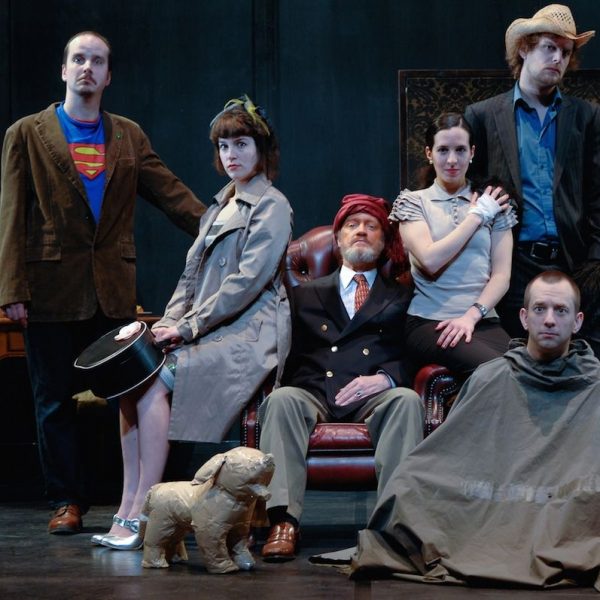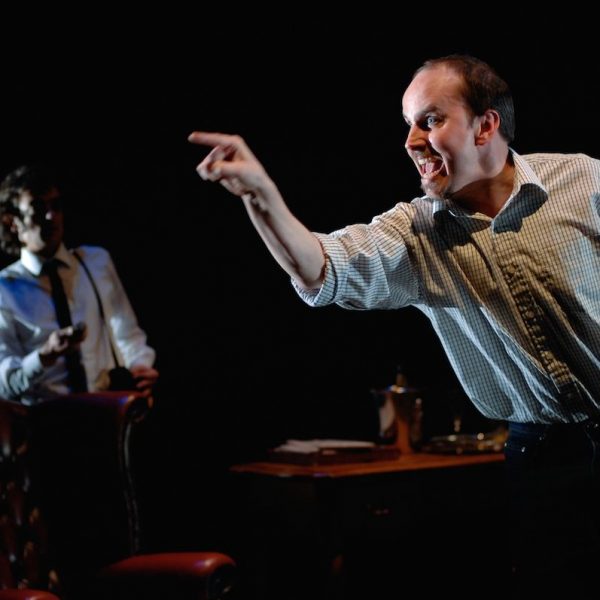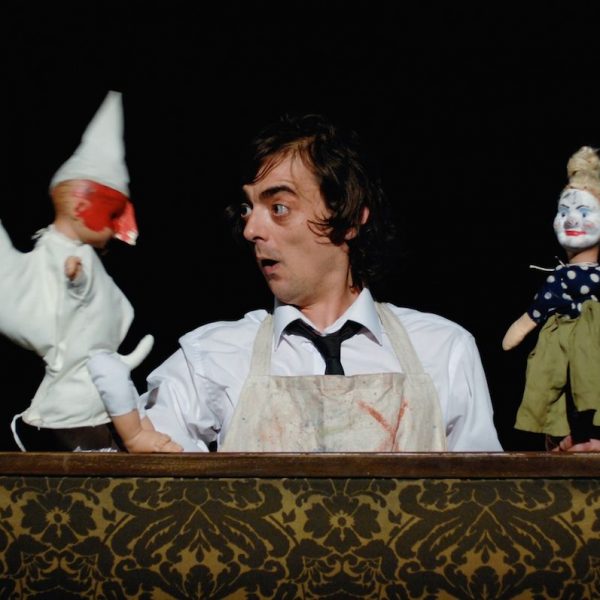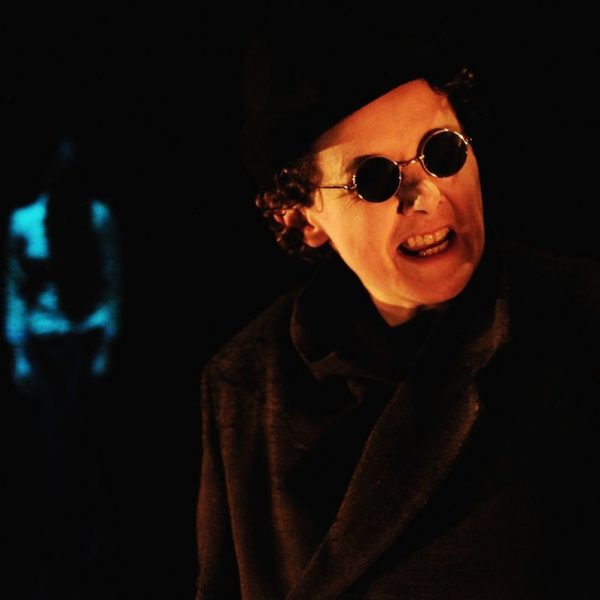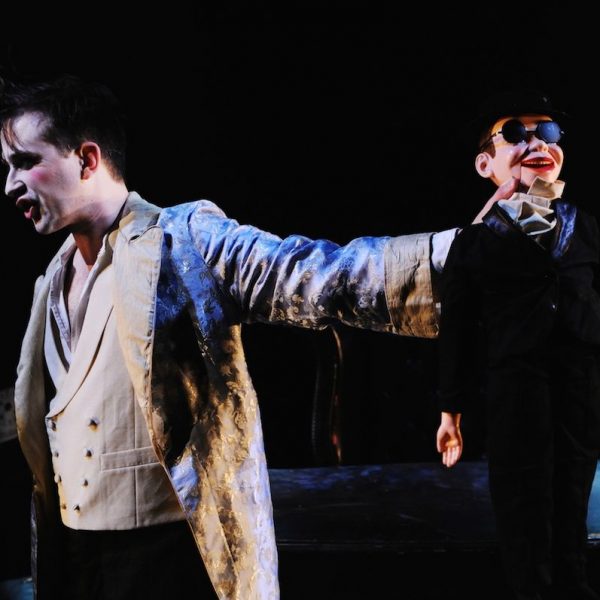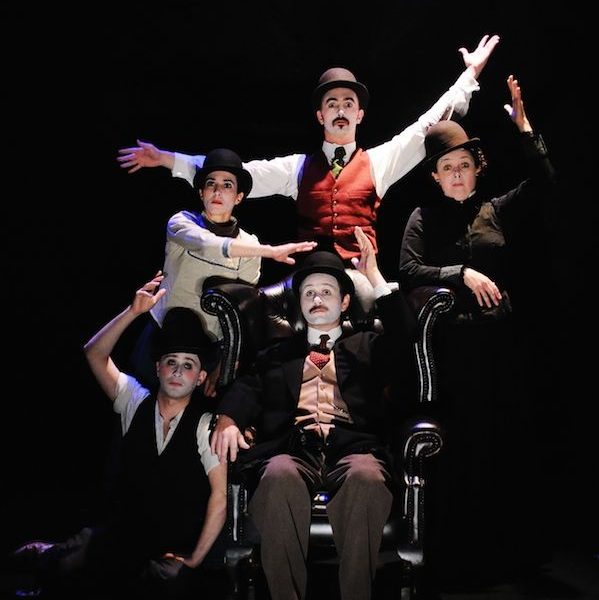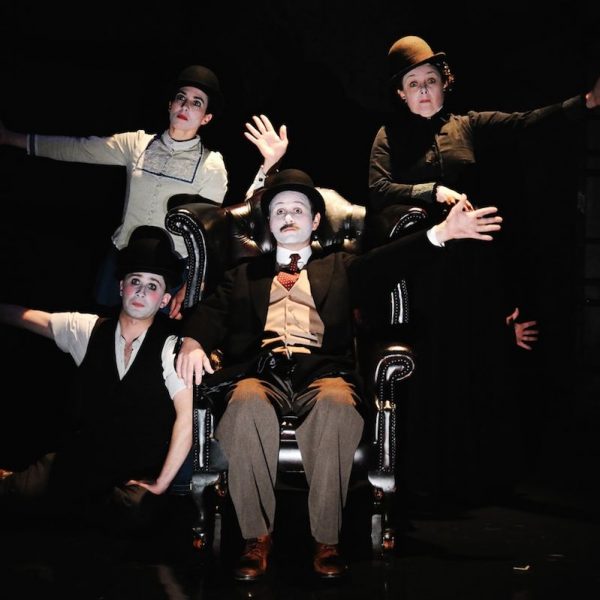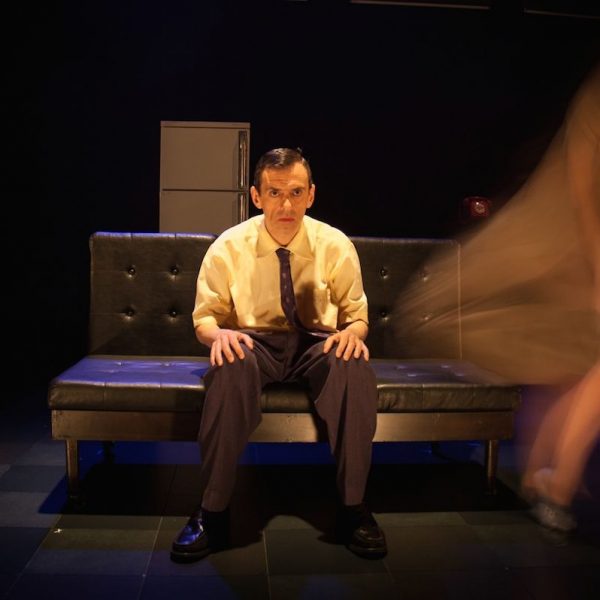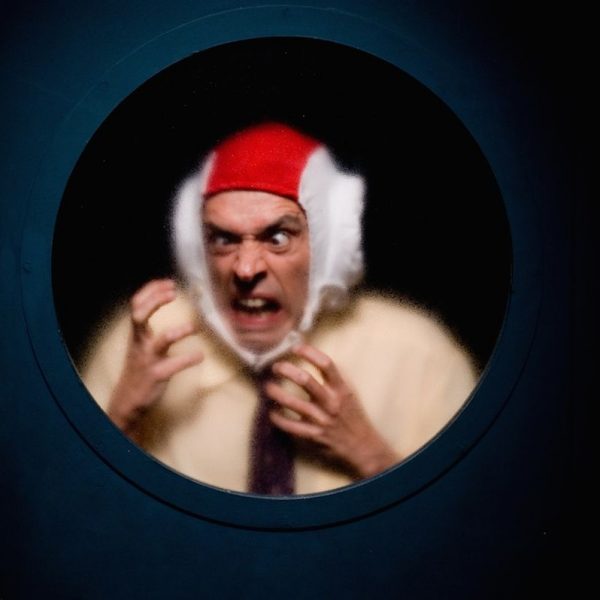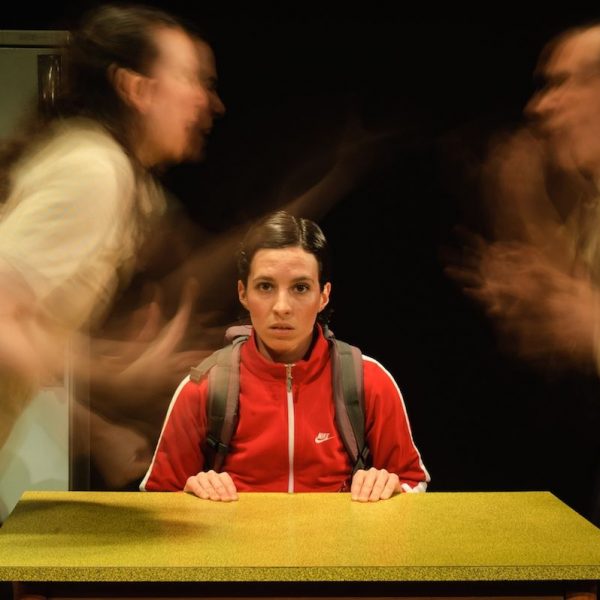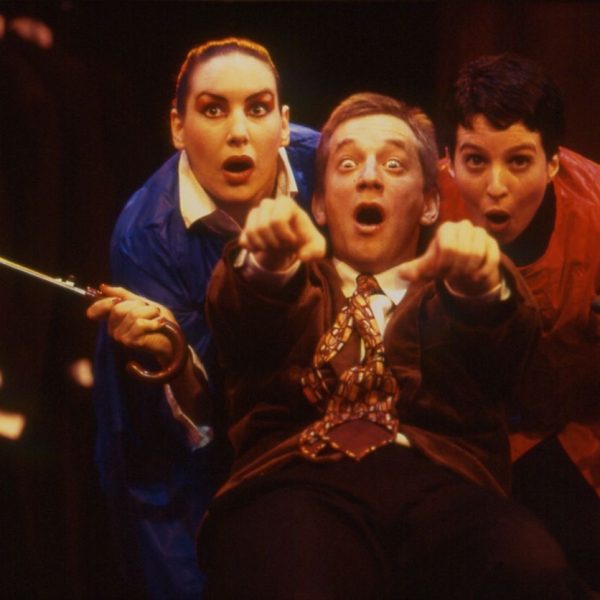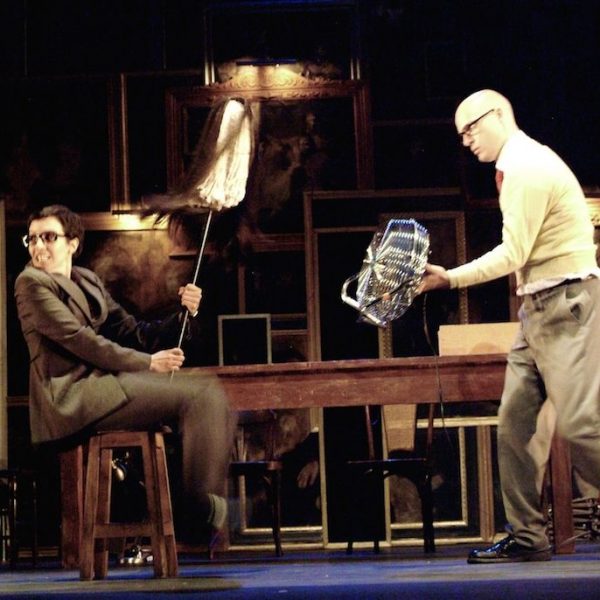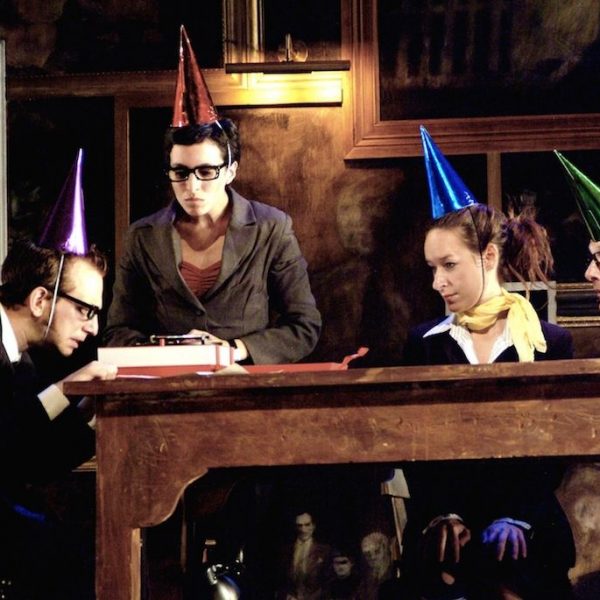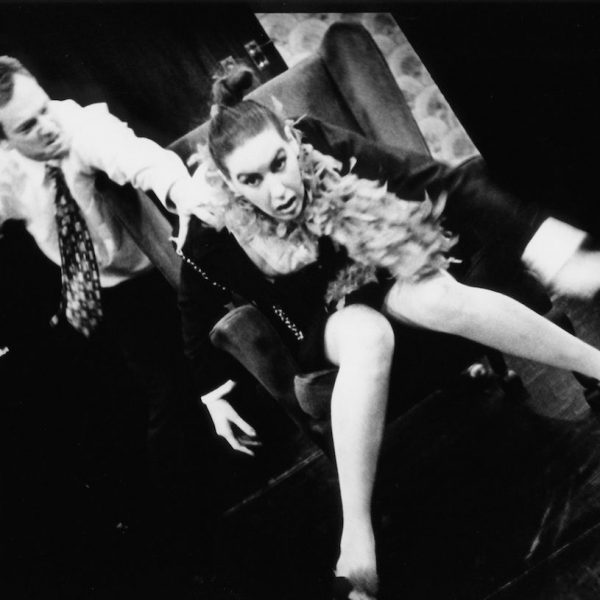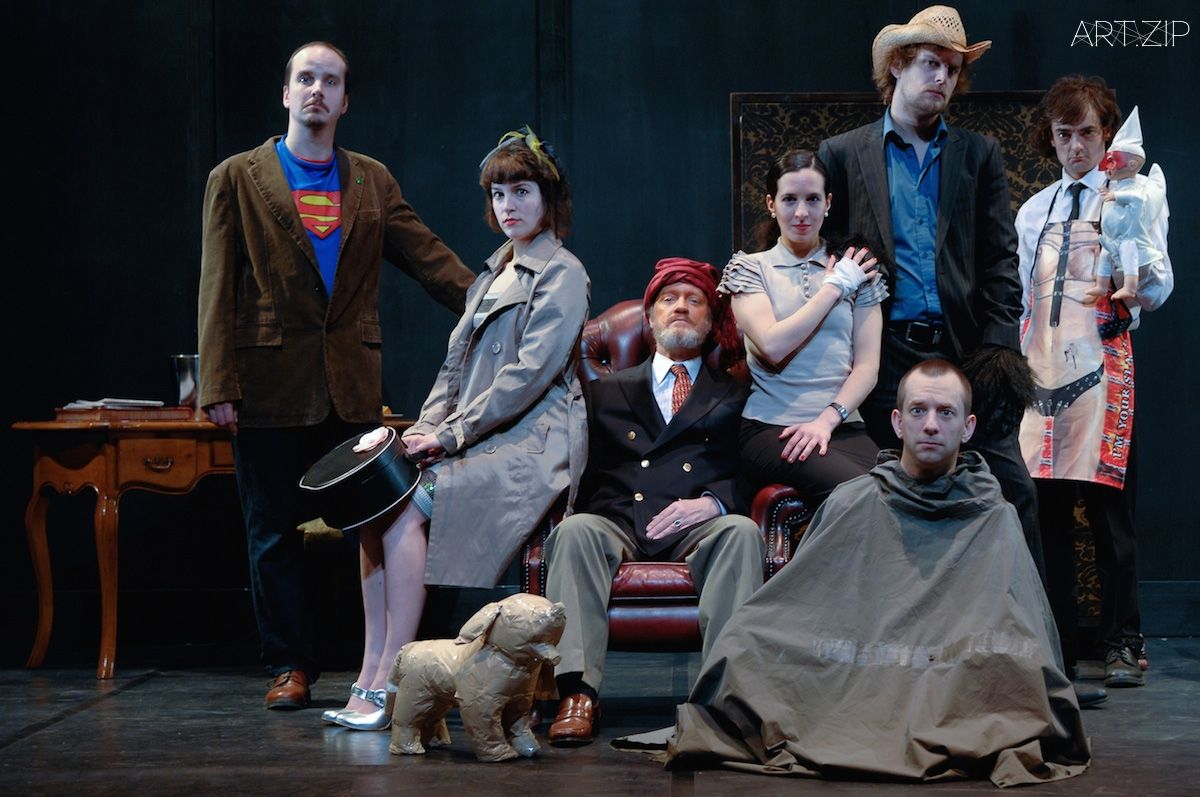
Text by: Ava Davies / 撰文:Ava Davies
Translated by: Li Ruixue / 翻譯:李瑞雪
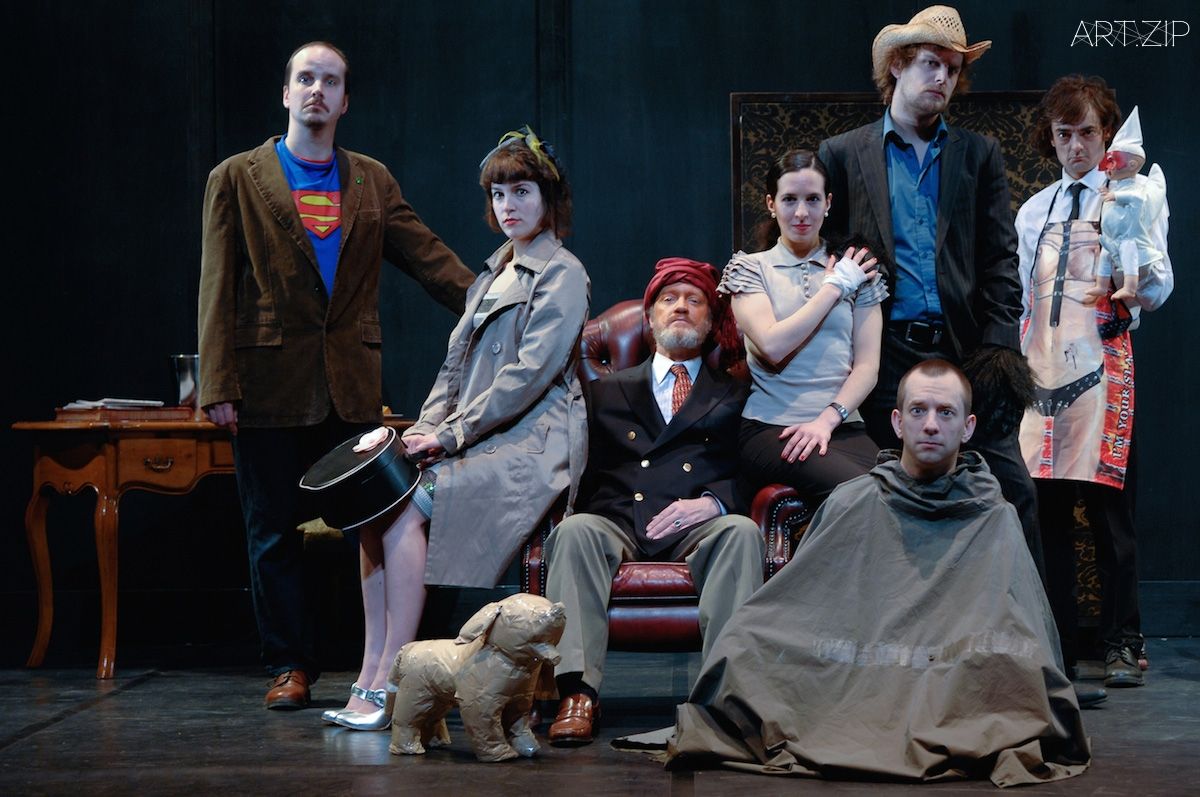
Delirium 3 (credit: Hugo Glendinning)
Dominic Burdess, Julie Bower, Clive Mendus, Carolina Valdés, Nick Lee, Joseph Alford, Lucien MacDougall
Theatre O is a difficult company to pin down: they have produced only a handful of shows in their 14-year tenure, with their artistic directors Joseph Alford and Carolina Valdes also choosing to collaborate with auteurs such as Katie Mitchell (on a children’s Christmas production of The Cat in the Hat at the National Theatre in 2009) and the Young Vic Theatre (on Juliet Stevenson’s ‘Happy Days’ in 2014), rather than solely create standalone works. They don’t have any specific theatrical influences: Alford comments that “first and foremost ‘life’ is our biggest artistic influence – what it is to live and struggle in the world and how to express those struggles and lives in a visually poetic and visceral way. We want to tell stories that come from looking out at the world, not gazing inward to the small world of theatre.” Their name arises from the exclamation, ‘oh’, which can express feelings of joy, sadness, pain and confusion, all of which are elements of life which the company choose to embrace whole-heartedly.
O劇院的風格很難被簡單概括:在劇院藝術總監約瑟夫·奧爾福德(Joseph Alford)和卡羅來納·巴爾德斯(Carolina Valdes)的帶領下,從其成立至今的14年中,他們不僅獨立創作了許多的劇目,而且與很多劇院和個人合作製作了眾多的作品,比如與導演凱蒂·米歇爾(Katie Michell)合作完成了2009年在英國國家劇院上演的兒童劇《帽子裡的貓(The Cat in the Hat)》;還有與倫敦青年維克劇院(Young Vic)合作完成的2014年上演的朱麗葉·史蒂文森(Juliet Stevenson)的《幸福時光(Happy Days)》。O劇院似乎並沒有一種特定的藝術風格,奧爾福德認為:“藝術創作的靈感來自於我們的生活,怎樣去用真摯且詩意的方式來表達我們在生活中面對的重重困難,以及我們究竟是為了什麼而努力生活,這些便是我們關注的核心,這也是藝術創作之中最為重要的部份。我們要放眼全世界去講述真實的故事,而不是把自己關在一個狹小的劇場空間之內。”O劇院的名字來自于字母“O”的發音,“喔”的發音象徵著我們感到喜悅、悲傷、痛苦亦或是困擾時會發出的聲音,這樣的隱喻也從側面印證了劇院“一切來源於生活”的藝術宗旨。
- Delirium 3 (credit: Hugo Glendinning) Dominic Burdess, Julie Bower, Clive Mendus, Carolina Valdés, Nick Lee, Joseph Alford, Lucien MacDougall
- Delirium 2 (credit: Hugo Glendinning) Lucien MacDougall, Dominic Burdess
- Delirium 1 (credit: Hugo Glendinning) Lucien MacDougall
Their rehearsal rooms are collaborative and friendly, relaxed atmospheres where burgeoning ideas and threads can be nurtured and turned into living, breathing pieces. The process of creation is almost as important as the product itself: they admire artists such as Ridiculusmus, Katie Mitchell and Romeo Castellucci, whose focus and attitude towards their work infuses the company’s drive. A broad range of techniques is used to showcase their ideas – physical theatre tends to be a main factor, as is the tactical use of music. Alford defines visual theatre as “theatre that finds visually poetic metaphors to express different human experiences” and a medium that also creates “a physical and imaginative empathy between the audience and what they are seeing”, a definition which sums up Theatre O’s oeuvre. The UK theatre scene’s preoccupation with text-based work is insufficient for the company, who seek to “find the theatrical forms that cut through the inadequacy of words and engage with us on that profound and unexpected level” and push the audience to experience and be challenged by, rather than just passively watch, a performance. It is Theatre O’s belief that creating arresting images pushes the audience to draw upon the “unconscious physical memory of [their] life experiences” and thus “receive and interpret instinctively”. And unlike many visual theatre companies, Theatre O does not have a reliance on technology and projected images, believing that in excess these can act as replacements for the audience’s imagination and lull them into a sense of unfulfilling security and comfort.
O劇院的排練室裡充滿了友好和放鬆的氣氛,這裡推崇協同作業和相互合作。很多作品的最初想法和構思都是在這裡誕生的,并在這裡不斷的孕育發展成為了我們所見到的那些令人歎為觀止的藝術佳作,對他們而言作品的創作過程與最後的成品同樣重要。他們非常重視與藝術家的合作,例如與瑞迪庫魯斯慕斯(Ridiculusumus)、凱蒂·米歇爾、羅密歐·凱斯特盧奇(Romeo Castellucci)這樣的藝術家合作,將他們強烈的個人風格融入到作品中,可以合力促進劇院的快速發展,同時,劇院也非常注重對於戲劇中各種表達手段和技術的運用,例如他們現在主要採用身體劇場的表現手法,而且對音樂的運用也是非常的在意。奧爾福德認為視覺劇院是“用詩意的隱喻來表達人們體驗”的一個場所,同時也是一種“可以與觀眾產生互動并充滿想像力的一個介質”,這兩種對視覺劇院的闡釋其實也正是對他們作品的最恰當的描述。當下的英國戲劇界,很多劇院還都將“以文本為核心”的戲劇作品作為工作的重點,但這對O劇院來說是遠遠不夠的,“將文本敘事的不完整性作為切入點,以此來探尋一種令人驚嘆的戲劇表達方式”是O劇院的創作特色,他們通過調動觀眾的情緒來讓他們融入到演出當中,而不是讓他們被動地接納舞臺上所發生的一切。
O劇院相信,通過創造禁錮的圖像可以喚醒觀眾的“潛意識的關於過往經驗的身體記憶”也可以通過這種記憶來“發現和釋放人類的本能”。與其他的視覺劇院不同,O劇院並不依賴投影和高科技設備,因為他們覺得過多的設備應用和線索會侵佔觀眾的想像空間,而且會把觀眾帶入一個過於安全和舒適的語境,從而減弱了演出本應帶給觀眾的那種充滿刺激和不安的情緒。(編者按:想像一下大家去遊樂場坐過山車,尋求的本來就是腎上腺素飆升的快感,如果換做是一個慢條斯理的沙發座椅在平路上以3邁速度“飛馳”的效果,估計大家就不會買賬了。)
- The Secret Agent 4 (credit: Joseph Alford) Carolina Valdés, Helena Lymbery
- The Secret Agent 3 (credit: Joseph Alford) Leander Deeny
- The Secret Agent 2 (credit: Joseph Alford) Carolina Valdés, Leander Deeny, George Potts, Dennis Herdman, Helena Lymbery
- The Secret Agent 1 (credit: Joseph Alford) Carolina Valdés, Leander Deeny, George Potts, Helena Lymbery
Theatre O certainly acknowledge the complexity of the relationship between audience and performer, recognising that visual theatre and the audience are symbiotic. Alford comments that as the audience, “We are recognising situations and emotions…through that experience ourselves. What [Theatre O] try to do is dig into the essence of what that experience is (as we see it) – therefore it is not just a replication of the experience, but an interpretation.” The company does not want their audience to be complacent: they have to infer information from the images shown to them by the performers, and draw on their own past experiences to give the production meaning.
O劇院非常了解演員與觀眾之間的複雜關係,并深刻意識到劇場和觀眾之間的關係是相輔相成的。奧爾福德表示:“通過多年的實踐,我們認識到人們是通過對整個環境的認知體驗來形成我們對外在的印象,不管是客觀的還是主觀的。我們想要做的,就是要挖掘到底是什麼構建了和形成了這種認知體驗,它來自于哪裡?只有了解了這種體驗,我們才能不僅僅是通過模仿來表現一種情緒,而是可以發自內心的來展現情緒的本來面目。”劇團也一直在挑戰觀眾的認知水品,觀眾們通過演員所獲得的影像,必須通過自己的消化和腦補才能形成完整的意義。
- Delirium 3 (credit: Hugo Glendinning) Dominic Burdess, Julie Bower, Clive Mendus, Carolina Valdés, Nick Lee, Joseph Alford, Lucien MacDougall
- Astronaut 3 (credit: Joseph Alford) Toni Arteaga, Eva Vilamitjana
- Astronaut 2 (credit: Joseph Alford) Toni Arteaga
- Astronaut 1 (credit: Joseph Alford) Eva Vilamitjana, Carolina Valdés, Toni Arteaga
Their feted 2013 adaptation of Joseph Conrad’s turn of the century novel The Secret Agent began life at the Edinburgh Fringe before transferring to the Young Vic Theatre. The novel addresses prescient themes of governmental bureaucracy, responsibility and corruption and the touring production draws out the essence of this in an admirably cogent running time. The account of the play’s conception is classic of Theatre O – starting out with a minimal script and their devisor-performers in a rehearsal room, the production took shape through improvisation alongside the actual script by the professionals, until a coherent form was created.
Theatre O unequivocally support the idea that life informs theatre and theatre informs the way in which we see the world. They are an optimistic company, forward-looking and exciting, who place faith in and never patronise their audiences. They understand that theatre can operate on a gut, profound level and they seek to create that feeling every time an audience sits down to watch one of their shows.
2013年,他們改編自約瑟夫·康拉德(Joseph Conrad)小說的作品《特務(The Secret Agent)》在愛丁堡邊緣藝術節公演前,曾在倫敦青年維克劇院上演。這部巡演作品將小說中涉及到的政府官僚作風、責任感以及腐敗等問題用令人欽佩的說服力在有限的表演時間裡表達的淋漓盡致。這部劇的創作模式也一樣沿襲了O劇團的創作傳統:先是在排練室中用最簡單的劇本進行演練,並在演員逐漸添加即興表演後將劇本內容逐漸豐滿。
生活影響著戲劇進而影響我們看世界的角度的這一觀點,是Theatre O始終堅持的。他們是一個樂觀向上的戲劇公司,總是朝好的一面看,並且富有激情,且從不包容他們的觀眾。他們始終追求讓每一位看他們演出的觀眾,都能真切體驗到他們大膽且不尋常的演出。
O劇院一直相信“生活影響了戲劇,而戲劇又影響了我們看待世界的方法”。他們是一個樂觀向上的戲劇公司,他們總是看到事物的積極一面,高瞻遠矚,充滿激情,他們將信念帶入自己的作品,而且絕不打算寵壞他們的觀眾。O劇團清楚地知道,他們要做的是大膽前衛的藝術創作,他們追求的是讓每一個觀眾在每一次觀看他們演出的時候都能夠看到一部獨一無二的演出,而且這種感受絕對不會與其他人有所雷同。
- 3 Dark Tales 1 Sarah Coxon, Joseph Alford, Carolina Valdés
- Delirium 2 (credit: Hugo Glendinning) Lucien MacDougall, Dominic Burdess
- Delirium 1 (credit: Hugo Glendinning) Lucien MacDougall
- The Secret Agent 4 (credit: Joseph Alford) Carolina Valdés, Helena Lymbery
- The Secret Agent 3 (credit: Joseph Alford) Leander Deeny
- The Secret Agent 2 (credit: Joseph Alford) Carolina Valdés, Leander Deeny, George Potts, Dennis Herdman, Helena Lymbery
- The Secret Agent 1 (credit: Joseph Alford) Carolina Valdés, Leander Deeny, George Potts, Helena Lymbery
- The Argument 2 (credit: Andrea López) Carolina Valdés, Luke Williams
- The Argument 1 (credit: Andrea López) Joseph Alford, Carolina Valdés, Kate Higginbottom, Luke Williams
- Delirium 3 (credit: Hugo Glendinning) Dominic Burdess, Julie Bower, Clive Mendus, Carolina Valdés, Nick Lee, Joseph Alford, Lucien MacDougall
- Astronaut 3 (credit: Joseph Alford) Toni Arteaga, Eva Vilamitjana
- Astronaut 2 (credit: Joseph Alford) Toni Arteaga
- Astronaut 1 (credit: Joseph Alford) Eva Vilamitjana, Carolina Valdés, Toni Arteaga
- 3 Dark Tales 2 Joseph Alford, Sarah Coxon

